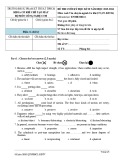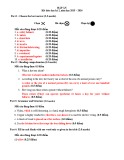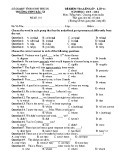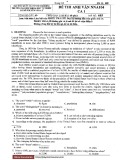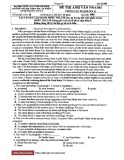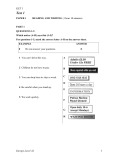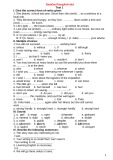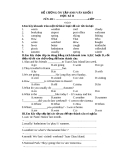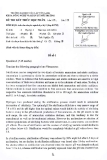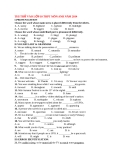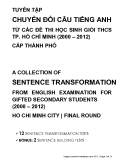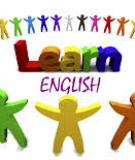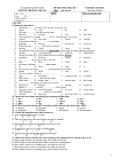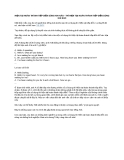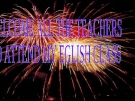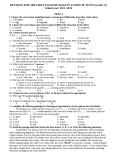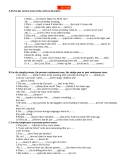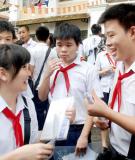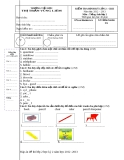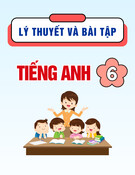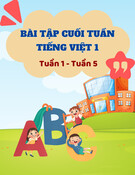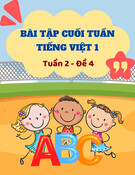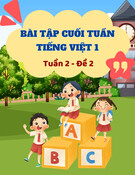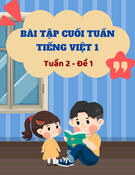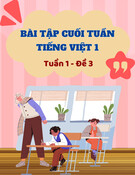SỞ GIÁO DỤC & ĐÀO TẠO BẮC NINH TRƯỜNG THPT QUẾ VÕ SỐ 1 ---------------
KỲ THI THỬ ĐẠI HỌC LẦN 2 - KHỐI D MÔN THI: TIẾNG ANH 11 (Thời gian làm bài: 90 phút) Mã đề: 152
Họ tên thí sinh: …………………………………………
SBD: ……………………………………………………...
D. corners D. serving D. until D. judge
C. parts C. help C. to C. eat C. discussing C. considered C. for C. each C. guest B. ways B. amount B. after B. finish B. talking B. thought B. at B. either B. landlord A. comment A. walks A. dish A. before A. end A. telling A. believed A. to A. neither A. host C. estimate D. use up B. value D. arguing D. regarding D. of D. both D. house owner
Mark the letter A, B, C, or D on your answer sheet to show the underlined part that needs correction. Question 1: Jack had to skip breakfast; otherwise, he will be late for class. A B C D Question 2: After writing it, the essay must be duplicated by the student himself and handed in to the department A B C secretary before the end of the month. D Question 3: They are known that colds can be avoided by eating the right kind of food and taking exercise A B C regularly. D Question 4: Before the invention of the printing press, books have been all printed by hand. A B C D Question 5: The medical problems of parents and their children tend to be very similar to because of the A B C D hereditary nature of many diseases. Read the passage and mark the letter A, B, C, or D on your answer sheet to indicate the correct word for each of the following blanks. The British often _____(6)_____ people by their table manners and, at the table as in other _____(7)_____ of British life, politeness and distance are priced. While it is acceptable to ask an American host for a second _____(8)_____, in England you should absolutely wait _____(9)_____ you are being offered. It is considered impolite not to _____(10)_____ what is on your plate. Also watch what you say: the British are very distant with strangers and while they love _____(11)_____ the weather, even such Câu as their age or whether they have any children may be _____(12)_____ too personal. Beware _____(13)_____ calling Scottish or Irish people “English”. Absolute no-nos are politics and religion, as they are, incidentally, in the United States. On both sides of the Atlantic, it is never a good idea to engage in arguments about _____(14)_____ while sitting at the table. You should also eat at roughly the same speed as the others at the table and never start your food before your _____(15)_____ does. Question 6: Question 7: Question 8: Question 9: Question 10: Question 11: Question 12: Question 13: Question 14: Question 15: Read the passage and mark the letter A, B, C, or D on your answer sheet to indicate the correct answer to each of the following questions. Large animals that inhabit the desert have evolved a number of adaptations for reducing the effects of extreme heat. One adaptation is to be light in color, and to reflect rather than absorb the Sun's rays. Desert mammals also depart from the normal mammalian practice of maintaining a constant body temperature. Instead of trying to keep down the body temperature deep inside the body, which would involve the expenditure of water and energy, desert mammals allow their temperatures to rise to what would normally be fever height, and temperatures as high as 46 degrees Celsius have been measured in Grant's gazelles. The overheated body then cools down during the cold desert night, and indeed the temperature may fall unusually low by dawn, as low as 34 degrees Celsius in the camel. This is an advantage since the heat of the first few hours of daylight is absorbed in warming up the body, and an excessive buildup of heat does not begin until well into the day. Another strategy of large desert animals is to tolerate the loss of body water to a point that would be fatal for non-adapted animals. The camel can lose up to 30 percent of its body weight as water without harm to itself, whereas human beings die after
C. preserving D. delaying
B. In the middle of the day D. Just after drinking losing only 12 to 13 percent of their body weight. An equally important adaptation is the ability to replenish this water loss at one drink. Desert animals can drink prodigious volumes in a short time, and camels have been known to imbibe over 100 liters in a few minutes. A very dehydrated person, on the other hand, cannot drink enough water to rehydrate at one session, because the human stomach is not sufficiently big and because a too rapid dilution of the body fluids causes death from water intoxication. The tolerance of water loss is of obvious advantage in the desert, as animals do not have to remain near a water hole but can obtain food from grazing sparse and far-flung pastures. Desert-adapted mammals have the further ability to feed normally when extremely dehydrated, it is a common experience in people that appetite is lost even under conditions of moderate thirst. Question 16: 1. What is the main topic of the passage? B. Adaptations of desert animals. A. Weather variations in the desert. C. Diseased of desert animals. D. Human use of desert animals. Question 17: According to the passage, why is light coloring an advantage to large desert animals? A. It helps them hide from predators. B. It does not absorb sunlight as much as dark colors. C. It helps them see their young at night. D. It keeps them cool at night. Question 18: The word "maintaining" is closest in meaning to _________. A. measuring B. inheriting Question 19: The author uses of Grant's gazelle as an example of A. an animal with a low average temperature B. an animal that is not as well adapted as the camel C. a desert animal that can withstand high body temperatures D. a desert animal with a constant body temperature Question 20: When is the internal temperature of a large desert mammal lower? A. Just before sunrise C. Just after sunset Question 21: The word "tolerate" is closest in meaning to _________. A. endure B. replace C. compensate D. reduce
B. Drinking polluted water. D. Lack of water.
D. get C. save B. carry
B. Eating while dehydrated. D. Being active at night.
D. survival D. fundamental
B. atmosphere B. biography B. advantage B. cycle B. spectacular A. tourism A. diversity A. energy A. solar A. ceremony C. canister C. biology C. biomass C. indoors C. facility D. arduous D. costly D. surprisingly
Question 22: What causes water intoxication? A. Drinking too much water very quickly. C. Bacteria in water. Question 23: Why does the author mention humans in the second paragraph? A. To show how they use camels. B. To contrast them to desert mammals. C. To give instructions about desert survival. D. To show how they have adapted to desert life. Question 24: The word "obtain" is closest in meaning to _________. A. digest Question 25: Which of the following is NOT mentioned as an adaptation of large desert animals? A. Variation in body temperatures. C. Drinking water quickly. Mark the letter A, B, C, or D on your answer sheet to indicate the word that differs from the rest in the position of the main stress in each of the following questions. Question 26: Question 27: Question 28: Question 29: Question 30: Mark the letter A, B, C, or D on your answer sheet to indicate the sentence that is closest in meaning to each of the following sentences. Question 31: She asked Janet to repeat what she had said. A. “Will you please repeat what Janet said?”, she asked. B. “Please repeat what Janet had said.”, she asked. C. “Please repeat what you say, Janet.”, she said. D. “Please repeat what you said, Janet.” , she said Question 32: Jenny denied breaking the window. A. Jenny was determined not to break the window. B. Jenny said that she hadn’t broken the window. C. Jenny didn’t break the window. D. Jenny refused to break the window. Question 33: I hardly know the truth about Jean’s success in the institute. A. Jean’s success in the institute was not to be known. B. It is difficult for Jean to be successful in the institute.
C. intellectual D. muscular B. brave
B. To honor Zeus. D. To sing songs about the athletes. C. I do not know much about Jean’s success in the institute. D. Jean hardly become known and successful in the institute. Question 34: After Louie had written his composition, he handed it to his teacher. A. Handed the composition to his teacher, Louie wrote it. B. Having written his composition, Louie handed it to his teacher. C. Writing the composition, Louie handed it to his teacher. D. Handing the composition, Louie had written his composition. Question 35: It is certain that the suspect committed the crime. A. The suspect was certain to commit the crime. B. The suspect might have committed the crime. C. Certain commitment of the crime was that of the suspect. D. The suspect must have committed the crime. Question 36: David drove so fast; it was very dangerous. A. David drove so fast, which was very dangerous. B. David drove so fast and was very dangerous. C. David drove so fast, then was very dangerous. D. David drove so fast that was very dangerous. Question 37: People believed that the boys started the fire. A. The boys were believed to have started the fire. B. That the boys started the fire was believed. C. It is believed that the fire was started by the boys. D. It is believed that the boys started the fire. Question 38: I had no problems at all during my trip to France. A. No problems were there during my trip to France at all. B. Everything went according to plan during my trip to France. C. My trip to France was not at all went as planned. D. No problems during my trip had I at all in France. Question 39: He felt very tired. However, he was determined to continue to climb up the mountain. A. He felt so tired that he was determined to continue to climb up the mountain. B. Feeling very tired, he was determined to continue to climb up the mountain. C. As the result of his tiredness, he was determined to continue to climb up the mountain. D. Tired as he might feel, he was determined to continue to climb up the mountain. Question 40: She heard the news of the death of her mother. She fainted. A. On hearing the news of her dead mother, she fainted. B. On hearing the news of her mother’s death, she fainted. C. She fainted so she heard the news of the death of her mother. D. She fainted and then she heard the news of the death of her mother. Read the passage and mark the letter A, B, C, or D on your answer sheet to indicate the correct answer to each of the following questions. In 776 B.C., the first Olympic Games were held at the foot of Mount Olympus to honor the Greek’s chief god, Zeus. The warm climate for outdoor activities, the need for preparedness in war, and their lifestyle caused the Greeks to create competitive sports. Only the elite and military could participate at first, but later the games were opened to all free Greek males who had no criminal record. The Greeks emphasized physical fitness and strength in their education of youth. Therefore, contests in running, jumping, javelin throwing, boxing, and horse and chariot racing were held in individual cities, and the winners competed every four years at Mount Olympus. Winners were greatly honored by having olive wreaths placed on their heads and having poems sung about their deeds. Originally these contests were held as games of friendship and any wars in progress were halted to allow the games to take place. They also helped to strengthen bonds among competitors and the different cities presented. The Greeks attached so much importance to the games that they calculated time in four-year cycles called “Olympiads”, dating from 776 B.C. . The contest coincided with religious festivities and constituted an all-out effort on the part of participants to please the gods. Any who disobeyed the rules were dismissed and seriously punished. These athletes brought shame not only to themselves but also to the cities they represented. Question 41: Which of the following is not true? A. Winners placed olive wreaths on their own heads. B. The games were held in Greek every four years. C. Battles were interrupted to participate in the games. D. Poems glorified the winners in songs. Question 42: The word “elite” is closest in meaning to _______. A. aristocracy Question 43: Why were the Olympic Games held? A. To stop wars. C. To crown the best athletes. Question 44: Approximately how many years ago did these games originate?
B. 1,200 years. C. 2,300 years. D. 2,800 years.
C. documents D. properties B. ancestors
B. started D. fixed
A. 800 years. Question 45: What conclusion can we draw about the ancient Greeks? A. They were pacifists. B. They believed athletic events were important. C. They were very simple. D. They couldn’t count so they used “Olympiads” for dates. Question 46: What is the main idea of this passage? A. Physical fitness was an integral part of the life of ancient Greeks. B. The Greeks severely punished those who didn’t participate in physical fitness programs. C. The Greeks had always encouraged everyone to participate in the games. D. The Greeks had the games coincide with religious festivities so that they could go back to war when the games were over. Question 47: The word “deeds” is closest in meaning to _________. A. accomplishments Question 48: Which of the following was ultimately required of all athletes competing in the Olympics? A. They must have completed military service. B. They had to attend special training sessions. C. They had to be Greek males with no criminal record. D. They had to be very religious. Question 49: The word “halted” means mostly nearly the same as ________. A. encouraged C. curtailed Question 50: What is an “Olympiad”? A. The time it took to finish the games. B. The time between games. C. The time it took to finish a war. D. The time it took the athletes to train. Mark the letter A, B, C, or D on your answer sheet to indicate the correct answer to each of the following questions Question 51: The letter _________ me of the theft hadn’t been signed. A. to accuse B. accused C. accusing D. that accuse Question 52: Over the last few months, garages _________ the price of petrol three times. A. have risen B. have put up C. raised D. have gone up Question 53: __________ migrate long distances is well documented. A. That it is birds B. That birds C. Birds that D. It is that birds Question 54: I am not able to go anywhere this weekend because I am up to my __________ in work. A. neck B. nose C. head D. eyes Question 55: Doctors have accepted that acupuncture can work for pain ___________. A. release B. liberation C. killing D. relief Question 56: She hates those who are not ___________ for appointment. She doesn’t want to wait. A. punctually B. punctual C. punctuality D. punctuate
B. are said to exist D. are said to have existed
Question 57: Many lists of “Wonders of the World” ___________ during the Middle Ages. A. said to be existed C. said to exist Question 58: A: Could I speak to Susan please? B: _____________ . A. Talking B. Speaking C. Calling D. Answering
B. It’s pleasing D. It was the least I could do Question 59: Liz: Thanks a lot for assisting me in the presentation. Jennifer: ______________ . A. It was really hard work C. I was glad Question 60: It is difficult to ___________ identical twins ___________. A. tell/ on B. speak/ out C. tell/ apart D. speak/ over
Question 61: Ivan: I have stacks of homework to do. Kyle: _________________ ! B. Cheers A. Congratulations C. You poor thing D. Oh bother Question 62: _____________ Christina is late, let’s begin without her. A. Since B. Nevertheless C. However D. Consequently Question 63: Nothing can ____________ the loss of the child. A. make up with B. make up for C. do with D. come up with
Question 64: One of the __________ of this work is that you can __________ experience. B. opportunities/ learn A. advantages/ have C. profits/ become D. benefits/ gain Question 65: When I called them, they didn’t answer. They pretended __________ already. A. to sleep B. sleeping C. having slept D. to have been sleeping
B. better quality than D. better quality than of Question 66: Laser disc provide images of ___________ either television signals or video tapes. A. better than C. better quality than those of Question 67: I haven’t got a passport, ____________ means I can’t leave my country.
A. which C. this D. it
B. Mike poured the drink D. The drink was being poured B. that Question 68: Having opened the bottle, _____________ for everyone. A. The drink was poured C. Mike pouring the drink Question 69: No one knows precisely how much he earns a month, but $2,500 can’t be ____________ of the mark. B. far C. broad D. distant A. wide Question 70: You may borrow my bike __________ you are careful with it. B. as long as C. as much as D. expecting A. even if
Question 71: Barry: Were you involved in the accident? Daniel: Yes, but I wasn’t to ___________ for it. A. charge B. accuse C. blame D. apologize
Question 72: Assistant: May I help you? Customer: ____________. A. You may go B. I don’t need help C. No problem D. I’m just looking
B. Yes, I am so glad D. Yes, yes. You can sit here Question 73: “Excuse me, is anybody sitting here?” _ “ _____________.” A. No, thanks C. Sorry, the seat is taken Question 74: She is ____________ polite a person to refuse. A. very B. such C. this D. much Question 75: _____________ the lesson well, Adrian couldn’t answer the teacher’s questions. A. Didn’t prepare B. Having prepared D. Not preparing
C. Preparing not Question 76: ____________ no proof, the judge refused to sentence him to death. B. There being A. It having C. Being D. There having Question 77: I __________ this letter while I was tidying up. A. came by B. brought in C. brought back D. came across
Question 78: If you hadn’t watched that late movie last night, you ________ sleepy now. B. might not have been A. wouldn’t have been C. wouldn’t be D. wouldn’t have been being Question 79: My old friend and colleague, John, __________ married. A. have just got B. has just got C. just have got D. just has got Question 80: I suggest that the doctor _________ up his mind without delay. A. makes B. make C. made D. is to make
----- The End -----
SỞ GIÁO DỤC & ĐÀO TẠO BẮC NINH TRƯỜNG THPT QUẾ VÕ SỐ 1 ---------------
KỲ THI THỬ ĐẠI HỌC LẦN 2 - KHỐI D MÔN THI: TIẾNG ANH 11 (Thời gian làm bài: 90 phút) Mã đề: 268
Họ tên thí sinh: ………………………………………..
SBD: …………………………………………………….
Mark the letter A, B, C, or D on your answer sheet to indicate the sentence that is closest in meaning to each of the following sentences. Question 1: After Louie had written his composition, he handed it to his teacher. A. Handed the composition to his teacher, Louie wrote it. B. Having written his composition, Louie handed it to his teacher. C. Writing the composition, Louie handed it to his teacher. D. Handing the composition, Louie had written his composition. Question 2: He felt very tired. However, he was determined to continue to climb up the mountain. A. He felt so tired that he was determined to continue to climb up the mountain. B. Feeling very tired, he was determined to continue to climb up the mountain. C. As the result of his tiredness, he was determined to continue to climb up the mountain. D. Tired as he might feel, he was determined to continue to climb up the mountain. Question 3: She heard the news of the death of her mother. She fainted. A. On hearing the news of her dead mother, she fainted. B. On hearing the news of her mother’s death, she fainted. C. She fainted so she heard the news of the death of her mother. D. She fainted and then she heard the news of the death of her mother. Question 4: I hardly know the truth about Jean’s success in the institute. A. Jean’s success in the institute was not to be known. B. It is difficult for Jean to be successful in the institute. C. I do not know much about Jean’s success in the institute. D. Jean hardly become known and successful in the institute. Question 5: It is certain that the suspect committed the crime. A. The suspect was certain to commit the crime. B. The suspect might have committed the crime. C. Certain commitment of the crime was that of the suspect. D. The suspect must have committed the crime. Question 6: People believed that the boys started the fire. A. The boys were believed to have started the fire. B. That the boys started the fire was believed. C. It is believed that the fire was started by the boys. D. It is believed that the boys started the fire. Question 7: She asked Janet to repeat what she had said. A. “Will you please repeat what Janet said?”, she asked. B. “Please repeat what Janet had said.”, she asked. C. “Please repeat what you say, Janet.”, she said. D. “Please repeat what you said, Janet.” , she said Question 8: I had no problems at all during my trip to France. A. No problems were there during my trip to France at all. B. Everything went according to plan during my trip to France. C. My trip to France was not at all went as planned. D. No problems during my trip had I at all in France. Question 9: David drove so fast; it was very dangerous. A. David drove so fast, which was very dangerous. B. David drove so fast and was very dangerous. C. David drove so fast, then was very dangerous. D. David drove so fast that was very dangerous. Question 10: Jenny denied breaking the window. A. Jenny was determined not to break the window. B. Jenny said that she hadn’t broken the window. C. Jenny didn’t break the window. D. Jenny refused to break the window.
D. corners D. serving D. until
D. arguing D. regarding D. of D. both D. house owner B. value D. use up C. estimate A. comment A. walks A. dish A. before A. end A. telling A. believed A. to A. neither A. host B. ways B. amount B. after B. finish B. talking B. thought B. at B. either B. landlord D. judge C. parts C. help C. to C. eat C. discussing C. considered C. for C. each C. guest
D. fundamental D. surprisingly D. costly D. survival C. biology C. facility C. indoors C. canister C. biomass A. diversity A. ceremony A. solar A. tourism A. energy B. biography B. spectacular B. cycle B. atmosphere B. advantage D. arduous
C. preserving D. delaying
Read the passage and mark the letter A, B, C, or D on your answer sheet to indicate the correct word for each of the following blanks. The British often _____(11)_____ people by their table manners and, at the table as in other _____(12)_____ of British life, politeness and distance are priced. While it is acceptable to ask an American host for a second _____(13)_____, in England you should absolutely wait _____(14)_____ you are being offered. It is considered impolite not to _____(15)_____ what is on your plate. Also watch what you say: the British are very distant with strangers and while they love _____(16)_____ the weather, even such Câu as their age or whether they have any children may be _____(17)_____ too personal. Beware _____(18)_____ calling Scottish or Irish people “English”. Absolute no-nos are politics and religion, as they are, incidentally, in the United States. On both sides of the Atlantic, it is never a good idea to engage in arguments about _____(19)_____ while sitting at the table. You should also eat at roughly the same speed as the others at the table and never start your food before your _____(20)_____ does. Question 11: Question 12: Question 13: Question 14: Question 15: Question 16: Question 17: Question 18: Question 19: Question 20: Mark the letter A, B, C, or D on your answer sheet to indicate the word that differs from the rest in the position of the main stress in each of the following questions. Question 21: Question 22: Question 23: Question 24: Question 25: Read the passage and mark the letter A, B, C, or D on your answer sheet to indicate the correct answer to each of the following questions. Large animals that inhabit the desert have evolved a number of adaptations for reducing the effects of extreme heat. One adaptation is to be light in color, and to reflect rather than absorb the Sun's rays. Desert mammals also depart from the normal mammalian practice of maintaining a constant body temperature. Instead of trying to keep down the body temperature deep inside the body, which would involve the expenditure of water and energy, desert mammals allow their temperatures to rise to what would normally be fever height, and temperatures as high as 46 degrees Celsius have been measured in Grant's gazelles. The overheated body then cools down during the cold desert night, and indeed the temperature may fall unusually low by dawn, as low as 34 degrees Celsius in the camel. This is an advantage since the heat of the first few hours of daylight is absorbed in warming up the body, and an excessive buildup of heat does not begin until well into the day. Another strategy of large desert animals is to tolerate the loss of body water to a point that would be fatal for non-adapted animals. The camel can lose up to 30 percent of its body weight as water without harm to itself, whereas human beings die after losing only 12 to 13 percent of their body weight. An equally important adaptation is the ability to replenish this water loss at one drink. Desert animals can drink prodigious volumes in a short time, and camels have been known to imbibe over 100 liters in a few minutes. A very dehydrated person, on the other hand, cannot drink enough water to rehydrate at one session, because the human stomach is not sufficiently big and because a too rapid dilution of the body fluids causes death from water intoxication. The tolerance of water loss is of obvious advantage in the desert, as animals do not have to remain near a water hole but can obtain food from grazing sparse and far-flung pastures. Desert-adapted mammals have the further ability to feed normally when extremely dehydrated, it is a common experience in people that appetite is lost even under conditions of moderate thirst. Question 26: 1. What is the main topic of the passage? B. Adaptations of desert animals. A. Weather variations in the desert. C. Diseased of desert animals. D. Human use of desert animals. Question 27: According to the passage, why is light coloring an advantage to large desert animals? A. It helps them hide from predators. B. It does not absorb sunlight as much as dark colors. C. It helps them see their young at night. D. It keeps them cool at night. Question 28: The word "maintaining" is closest in meaning to _________. A. measuring B. inheriting Question 29: The author uses of Grant's gazelle as an example of A. an animal with a low average temperature B. an animal that is not as well adapted as the camel
B. In the middle of the day D. Just after drinking
D. reduce B. replace C. compensate
B. Drinking polluted water. D. Lack of water.
C. save B. carry D. get
B. Eating while dehydrated. D. Being active at night.
C. a desert animal that can withstand high body temperatures D. a desert animal with a constant body temperature Question 30: When is the internal temperature of a large desert mammal lower? A. Just before sunrise C. Just after sunset Question 31: The word "tolerate" is closest in meaning to _________. A. endure Question 32: What causes water intoxication? A. Drinking too much water very quickly. C. Bacteria in water. Question 33: Why does the author mention humans in the second paragraph? A. To show how they use camels. B. To contrast them to desert mammals. C. To give instructions about desert survival. D. To show how they have adapted to desert life. Question 34: The word "obtain" is closest in meaning to _________. A. digest Question 35: Which of the following is NOT mentioned as an adaptation of large desert animals? A. Variation in body temperatures. C. Drinking water quickly. Read the passage and mark the letter A, B, C, or D on your answer sheet to indicate the correct answer to each of the following questions. In 776 B.C., the first Olympic Games were held at the foot of Mount Olympus to honor the Greek’s chief god, Zeus. The warm climate for outdoor activities, the need for preparedness in war, and their lifestyle caused the Greeks to create competitive sports. Only the elite and military could participate at first, but later the games were opened to all free Greek males who had no criminal record. The Greeks emphasized physical fitness and strength in their education of youth. Therefore, contests in running, jumping, javelin throwing, boxing, and horse and chariot racing were held in individual cities, and the winners competed every four years at Mount Olympus. Winners were greatly honored by having olive wreaths placed on their heads and having poems sung about their deeds. Originally these contests were held as games of friendship and any wars in progress were halted to allow the games to take place. They also helped to strengthen bonds among competitors and the different cities presented. The Greeks attached so much importance to the games that they calculated time in four-year cycles called “Olympiads”, dating from 776 B.C. . The contest coincided with religious festivities and constituted an all-out effort on the part of participants to please the gods. Any who disobeyed the rules were dismissed and seriously punished. These athletes brought shame not only to themselves but also to the cities they represented. Question 36: Which of the following is not true? A. Winners placed olive wreaths on their own heads. B. The games were held in Greek every four years. C. Battles were interrupted to participate in the games. D. Poems glorified the winners in songs. Question 37: The word “elite” is closest in meaning to _______. A. aristocracy B. brave C. intellectual D. muscular
B. To honor Zeus. D. To sing songs about the athletes. Question 38: Why were the Olympic Games held? A. To stop wars. C. To crown the best athletes. Question 39: Approximately how many years ago did these games originate? A. 800 years. B. 1,200 years. C. 2,300 years. D. 2,800 years.
Question 40: What conclusion can we draw about the ancient Greeks? A. They were pacifists. B. They believed athletic events were important. C. They were very simple. D. They couldn’t count so they used “Olympiads” for dates. Question 41: What is the main idea of this passage? A. Physical fitness was an integral part of the life of ancient Greeks. B. The Greeks severely punished those who didn’t participate in physical fitness programs. C. The Greeks had always encouraged everyone to participate in the games. D. The Greeks had the games coincide with religious festivities so that they could go back to war when the games were over. Question 42: The word “deeds” is closest in meaning to _________. A. accomplishments B. ancestors C. documents D. properties
Question 43: Which of the following was ultimately required of all athletes competing in the Olympics? A. They must have completed military service. B. They had to attend special training sessions. C. They had to be Greek males with no criminal record. D. They had to be very religious. Question 44: The word “halted” means mostly nearly the same as ________.
A. encouraged B. started C. curtailed D. fixed
Question 45: What is an “Olympiad”? A. The time it took to finish the games. B. The time between games. C. The time it took to finish a war. D. The time it took the athletes to train. Mark the letter A, B, C, or D on your answer sheet to show the underlined part that needs correction. Question 46: After writing it, the essay must be duplicated by the student himself and handed in to the A B C department secretary before the end of the month. D Question 47: Jack had to skip breakfast; otherwise, he will be late for class. A B C D Question 48: They are known that colds can be avoided by eating the right kind of food and taking exercise A B C regularly. D Question 49: Before the invention of the printing press, books have been all printed by hand. A B C D Question 50: The medical problems of parents and their children tend to be very similar to because of the A B C D hereditary nature of many diseases. Mark the letter A, B, C, or D on your answer sheet to indicate the correct answer to each of the following questions. Question 51: The letter _________ me of the theft hadn’t been signed. A. to accuse B. accused C. accusing D. that accuse
Question 52: Barry: Were you involved in the accident? Daniel: Yes, but I wasn’t to ___________ for it. A. charge B. accuse C. blame D. apologize Question 53: My old friend and colleague, John, __________ married. A. have just got B. has just got C. just have got D. just has got
B. are said to exist D. are said to have existed
B. It’s pleasing D. It was the least I could do Question 54: If you hadn’t watched that late movie last night, you ________ sleepy now. B. might not have been A. wouldn’t have been C. wouldn’t be D. wouldn’t have been being Question 55: Many lists of “Wonders of the World” ___________ during the Middle Ages. A. said to be existed C. said to exist Question 56: Liz: Thanks a lot for assisting me in the presentation. Jennifer: ______________ . A. It was really hard work C. I was glad Question 57: _____________ Christina is late, let’s begin without her. A. Since B. Nevertheless C. However D. Consequently Question 58: Doctors have accepted that acupuncture can work for pain ___________. A. release D. relief
A. even if C. as much as D. expecting C. killing B. liberation Question 59: You may borrow my bike __________ you are careful with it. B. as long as Question 60: I suggest that the doctor _________ up his mind without delay. A. makes B. make C. made D. is to make Question 61: _____________ the lesson well, Adrian couldn’t answer the teacher’s Câu. A. Didn’t prepare C. Preparing not D. Not preparing B. Having prepared Question 62: I haven’t got a passport, ____________ means I can’t leave my country. A. which B. that C. this D. it Question 63: I am not able to go anywhere this weekend because I am up to my __________ in work. A. neck B. nose C. head D. eyes Question 64: She hates those who are not ___________ for appointment. She doesn’t want to wait. A. punctually B. punctual C. punctuality D. punctuate Question 65: No one knows precisely how much he earns a month, but $2,500 can’t be ____________ of the mark. A. wide C. broad D. distant B. far Question 66: __________ migrate long distances is well documented. C. Birds that D. It is that birds A. That it is birds B. That birds
Question 67: A: Could I speak to Susan please? B: _____________ . A. Talking B. Speaking C. Calling D. Answering
B. better quality than D. better quality than of Question 68: Laser disc provide images of ___________ either television signals or video tapes. A. better than C. better quality than those of Question 69: When I called them, they didn’t answer. They pretended __________ already. A. to sleep B. sleeping C. having slept D. to have been sleeping Question 70: Over the last few months, garages _________ the price of petrol three times. A. have risen B. have put up C. raised D. have gone up Question 71: Nothing can ____________ the loss of the child. A. make up with C. do with D. come up with
B. make up for Question 72: ____________ no proof, the judge refused to sentence him to death. B. There being A. It having C. Being D. There having Question 73: I __________ this letter while I was tidying up. A. came by B. brought in C. brought back D. came across
Question 74: One of the __________ of this work is that you can __________ experience. B. opportunities/ learn A. advantages/ have C. profits/ become D. benefits/ gain
B. Mike poured the drink D. The drink was being poured Question 75: Having opened the bottle, _____________ for everyone. A. The drink was poured C. Mike pouring the drink Question 76: She is ____________ polite a person to refuse. A. very B. such C. this D. much
Question 77: Ivan: I have stacks of homework to do. Kyle: _________________ ! B. Cheers A. Congratulations C. You poor thing D. Oh bother
Question 78: Assistant: May I help you? Customer: ____________. A. You may go B. I don’t need help C. No problem D. I’m just looking Question 79: It is difficult to ___________ identical twins ___________. A. tell/ on B. speak/ out C. tell/ apart D. speak/ over
B. Yes, I am so glad D. Yes, yes. You can sit here Question 80: “Excuse me, is anybody sitting here?” _ “ _____________.” A. No, thanks C. Sorry, the seat is taken
----- The End -----
SỞ GIÁO DỤC & ĐÀO TẠO BẮC NINH TRƯỜNG THPT QUẾ VÕ SỐ 1 ---------------
KỲ THI THỬ ĐẠI HỌC LẦN 2 - KHỐI D MÔN THI: TIẾNG ANH 11 (Thời gian làm bài: 90 phút) Mã đề: 325
Họ tên thí sinh: ………………………………………..
SBD: …………………………………………………….
C. preserving B. inheriting D. delaying
Mark the letter A, B, C, or D on your answer sheet to show the underlined part that needs correction. Question 1: Before the invention of the printing press, books have been all printed by hand. A B C D Question 2: Jack had to skip breakfast; otherwise, he will be late for class. A B C D Question 3: After writing it, the essay must be duplicated by the student himself and handed in to the department A B C secretary before the end of the month. D Question 4: The medical problems of parents and their children tend to be very similar to because of the A B C D hereditary nature of many diseases. Question 5: They are known that colds can be avoided by eating the right kind of food and taking exercise A B C regularly. D Read the passage and mark the letter A, B, C, or D on your answer sheet to indicate the correct answer to each of the following questions. Large animals that inhabit the desert have evolved a number of adaptations for reducing the effects of extreme heat. One adaptation is to be light in color, and to reflect rather than absorb the Sun's rays. Desert mammals also depart from the normal mammalian practice of maintaining a constant body temperature. Instead of trying to keep down the body temperature deep inside the body, which would involve the expenditure of water and energy, desert mammals allow their temperatures to rise to what would normally be fever height, and temperatures as high as 46 degrees Celsius have been measured in Grant's gazelles. The overheated body then cools down during the cold desert night, and indeed the temperature may fall unusually low by dawn, as low as 34 degrees Celsius in the camel. This is an advantage since the heat of the first few hours of daylight is absorbed in warming up the body, and an excessive buildup of heat does not begin until well into the day. Another strategy of large desert animals is to tolerate the loss of body water to a point that would be fatal for non-adapted animals. The camel can lose up to 30 percent of its body weight as water without harm to itself, whereas human beings die after losing only 12 to 13 percent of their body weight. An equally important adaptation is the ability to replenish this water loss at one drink. Desert animals can drink prodigious volumes in a short time, and camels have been known to imbibe over 100 liters in a few minutes. A very dehydrated person, on the other hand, cannot drink enough water to rehydrate at one session, because the human stomach is not sufficiently big and because a too rapid dilution of the body fluids causes death from water intoxication. The tolerance of water loss is of obvious advantage in the desert, as animals do not have to remain near a water hole but can obtain food from grazing sparse and far-flung pastures. Desert-adapted mammals have the further ability to feed normally when extremely dehydrated, it is a common experience in people that appetite is lost even under conditions of moderate thirst. Question 6: 1. What is the main topic of the passage? B. Adaptations of desert animals. A. Weather variations in the desert. C. Diseased of desert animals. D. Human use of desert animals. Question 7: According to the passage, why is light coloring an advantage to large desert animals? A. It helps them hide from predators. B. It does not absorb sunlight as much as dark colors. C. It helps them see their young at night. D. It keeps them cool at night. Question 8: The word "maintaining" is closest in meaning to _________. A. measuring Question 9: The author uses of Grant's gazelle as an example of A. an animal with a low average temperature B. an animal that is not as well adapted as the camel C. a desert animal that can withstand high body temperatures D. a desert animal with a constant body temperature
B. In the middle of the day D. Just after drinking
B. replace C. compensate D. reduce
B. Drinking polluted water. D. Lack of water.
Question 10: When is the internal temperature of a large desert mammal lower? A. Just before sunrise C. Just after sunset Question 11: The word "tolerate" is closest in meaning to _________. A. endure Question 12: What causes water intoxication? A. Drinking too much water very quickly. C. Bacteria in water. Question 13: Why does the author mention humans in the second paragraph? A. To show how they use camels. B. To contrast them to desert mammals. C. To give instructions about desert survival. D. To show how they have adapted to desert life. Question 14: The word "obtain" is closest in meaning to _________. A. digest B. carry C. save D. get
B. Eating while dehydrated. D. Being active at night.
Question 15: Which of the following is NOT mentioned as an adaptation of large desert animals? A. Variation in body temperatures. C. Drinking water quickly. Mark the letter A, B, C, or D on your answer sheet to indicate the sentence that is closest in meaning to each of the following sentences. Question 16: After Louie had written his composition, he handed it to his teacher. A. Handed the composition to his teacher, Louie wrote it. B. Having written his composition, Louie handed it to his teacher. C. Writing the composition, Louie handed it to his teacher. D. Handing the composition, Louie had written his composition. Question 17: People believed that the boys started the fire. A. The boys were believed to have started the fire. B. That the boys started the fire was believed. C. It is believed that the fire was started by the boys. D. It is believed that the boys started the fire. Question 18: He felt very tired. However, he was determined to continue to climb up the mountain. A. He felt so tired that he was determined to continue to climb up the mountain. B. Feeling very tired, he was determined to continue to climb up the mountain. C. As the result of his tiredness, he was determined to continue to climb up the mountain. D. Tired as he might feel, he was determined to continue to climb up the mountain. Question 19: She heard the news of the death of her mother. She fainted. A. On hearing the news of her dead mother, she fainted. B. On hearing the news of her mother’s death, she fainted. C. She fainted so she heard the news of the death of her mother. D. She fainted and then she heard the news of the death of her mother. Question 20: I had no problems at all during my trip to France. A. No problems were there during my trip to France at all. B. Everything went according to plan during my trip to France. C. My trip to France was not at all went as planned. D. No problems during my trip had I at all in France. Question 21: David drove so fast; it was very dangerous. A. David drove so fast, which was very dangerous. B. David drove so fast and was very dangerous. C. David drove so fast, then was very dangerous. D. David drove so fast that was very dangerous. Question 22: Jenny denied breaking the window. A. Jenny was determined not to break the window. B. Jenny said that she hadn’t broken the window. C. Jenny didn’t break the window. D. Jenny refused to break the window. Question 23: I hardly know the truth about Jean’s success in the institute. A. Jean’s success in the institute was not to be known. B. It is difficult for Jean to be successful in the institute. C. I do not know much about Jean’s success in the institute. D. Jean hardly become known and successful in the institute. Question 24: She asked Janet to repeat what she had said. A. “Will you please repeat what Janet said?”, she asked. B. “Please repeat what Janet had said.”, she asked. C. “Please repeat what you say, Janet.”, she said. D. “Please repeat what you said, Janet.” , she said
Question 25: It is certain that the suspect committed the crime. A. The suspect was certain to commit the crime. B. The suspect might have committed the crime. C. Certain commitment of the crime was that of the suspect. D. The suspect must have committed the crime. Mark the letter A, B, C, or D on your answer sheet to indicate the correct answer to each of the following questions. Question 26: _____________ Christina is late, let’s begin without her. A. Since B. Nevertheless C. However D. Consequently Question 27: No one knows precisely how much he earns a month, but $2,500 can’t be ____________ of the mark. A. wide B. far C. broad D. distant Question 28: She is ____________ polite a person to refuse. A. very B. such C. this D. much Question 29: Doctors have accepted that acupuncture can work for pain ___________. A. release B. liberation C. killing D. relief Question 30: I haven’t got a passport, ____________ means I can’t leave my country. A. which B. that C. this D. it Question 31: When I called them, they didn’t answer. They pretended __________ already. A. to sleep B. sleeping C. having slept D. to have been sleeping Question 32: My old friend and colleague, John, __________ married. A. have just got B. has just got C. just have got D. just has got
Question 33: Assistant: May I help you? Customer: ____________. A. You may go B. I don’t need help C. No problem D. I’m just looking
B. Yes, I am so glad D. Yes, yes. You can sit here
B. better quality than D. better quality than of Question 34: “Excuse me, is anybody sitting here?” _ “ _____________.” A. No, thanks C. Sorry, the seat is taken Question 35: Laser disc provide images of ___________ either television signals or video tapes. A. better than C. better quality than those of Question 36: I am not able to go anywhere this weekend because I am up to my __________ in work. A. neck B. nose C. head D. eyes
Question 37: You may borrow my bike __________ you are careful with it. B. as long as A. even if C. as much as D. expecting
B. It’s pleasing D. It was the least I could do
B. are said to exist D. are said to have existed
B. Mike poured the drink D. The drink was being poured Question 38: Liz: Thanks a lot for assisting me in the presentation. Jennifer: ______________ . A. It was really hard work C. I was glad Question 39: Many lists of “Wonders of the World” ___________ during the Middle Ages. A. said to be existed C. said to exist Question 40: If you hadn’t watched that late movie last night, you ________ sleepy now. B. might not have been A. wouldn’t have been C. wouldn’t be D. wouldn’t have been being Question 41: Having opened the bottle, _____________ for everyone. A. The drink was poured C. Mike pouring the drink Question 42: Over the last few months, garages _________ the price of petrol three times. A. have risen B. have put up C. raised D. have gone up Question 43: I __________ this letter while I was tidying up. A. came by B. brought in C. brought back D. came across
Question 44: Barry: Were you involved in the accident? Daniel: Yes, but I wasn’t to ___________ for it. A. charge C. blame D. apologize B. accuse Question 45: I suggest that the doctor _________ up his mind without delay. A. makes B. make C. made D. is to make Question 46: She hates those who are not ___________ for appointment. She doesn’t want to wait. A. punctually B. punctual C. punctuality D. punctuate
Question 47: ____________ no proof, the judge refused to sentence him to death. B. There being A. It having C. Being D. There having Question 48: _____________ the lesson well, Adrian couldn’t answer the teacher’s Câu. A. Didn’t prepare B. Having prepared C. Preparing not D. Not preparing Question 49: Nothing can ____________ the loss of the child. A. make up with B. make up for C. do with D. come up with
Question 50: One of the __________ of this work is that you can __________ experience. B. opportunities/ learn A. advantages/ have C. profits/ become D. benefits/ gain
Question 51: __________ migrate long distances is well documented. A. That it is birds B. That birds C. Birds that D. It is that birds
Question 52: A: Could I speak to Susan please? B: _____________ . A. Talking B. Speaking C. Calling D. Answering
Question 53: Ivan: I have stacks of homework to do. Kyle: _________________ ! B. Cheers A. Congratulations C. You poor thing D. Oh bother Question 54: The letter _________ me of the theft hadn’t been signed. A. to accuse B. accused C. accusing D. that accuse Question 55: It is difficult to ___________ identical twins ___________. A. tell/ on B. speak/ out C. tell/ apart D. speak/ over
D. costly D. survival D. fundamental D. surprisingly D. arduous C. indoors C. canister C. biology C. facility C. biomass A. solar A. tourism A. diversity A. ceremony A. energy B. cycle B. atmosphere B. biography B. spectacular B. advantage
C. intellectual D. muscular B. brave
B. To honor Zeus. D. To sing songs about the athletes.
D. 2,800 years. C. 2,300 years. B. 1,200 years.
C. documents D. properties B. ancestors
Mark the letter A, B, C, or D on your answer sheet to indicate the word that differs from the rest in the position of the main stress in each of the following questions. Question 56: Question 57: Question 58: Question 59: Question 60: Read the passage and mark the letter A, B, C, or D on your answer sheet to indicate the correct answer to each of the following questions. In 776 B.C., the first Olympic Games were held at the foot of Mount Olympus to honor the Greek’s chief god, Zeus. The warm climate for outdoor activities, the need for preparedness in war, and their lifestyle caused the Greeks to create competitive sports. Only the elite and military could participate at first, but later the games were opened to all free Greek males who had no criminal record. The Greeks emphasized physical fitness and strength in their education of youth. Therefore, contests in running, jumping, javelin throwing, boxing, and horse and chariot racing were held in individual cities, and the winners competed every four years at Mount Olympus. Winners were greatly honored by having olive wreaths placed on their heads and having poems sung about their deeds. Originally these contests were held as games of friendship and any wars in progress were halted to allow the games to take place. They also helped to strengthen bonds among competitors and the different cities presented. The Greeks attached so much importance to the games that they calculated time in four-year cycles called “Olympiads”, dating from 776 B.C. . The contest coincided with religious festivities and constituted an all-out effort on the part of participants to please the gods. Any who disobeyed the rules were dismissed and seriously punished. These athletes brought shame not only to themselves but also to the cities they represented. Question 61: Which of the following is not true? A. Winners placed olive wreaths on their own heads. B. The games were held in Greek every four years. C. Battles were interrupted to participate in the games. D. Poems glorified the winners in songs. Question 62: The word “elite” is closest in meaning to _______. A. aristocracy Question 63: Why were the Olympic Games held? A. To stop wars. C. To crown the best athletes. Question 64: Approximately how many years ago did these games originate? A. 800 years. Question 65: What conclusion can we draw about the ancient Greeks? A. They were pacifists. B. They believed athletic events were important. C. They were very simple. D. They couldn’t count so they used “Olympiads” for dates. Question 66: What is the main idea of this passage? A. Physical fitness was an integral part of the life of ancient Greeks. B. The Greeks severely punished those who didn’t participate in physical fitness programs. C. The Greeks had always encouraged everyone to participate in the games. D. The Greeks had the games coincide with religious festivities so that they could go back to war when the games were over. Question 67: The word “deeds” is closest in meaning to _________. A. accomplishments Question 68: Which of the following was ultimately required of all athletes competing in the Olympics? A. They must have completed military service. B. They had to attend special training sessions. C. They had to be Greek males with no criminal record. D. They had to be very religious. Question 69: The word “halted” means mostly nearly the same as ________.
D. fixed B. started C. curtailed
D. corners D. serving D. until
C. estimate D. use up B. value D. judge C. parts C. help C. to C. eat C. discussing C. considered C. for C. each C. guest B. ways B. amount B. after B. finish B. talking B. thought B. at B. either B. landlord A. comment A. walks A. dish A. before A. end A. telling A. believed A. to A. neither A. host D. arguing D. regarding D. of D. both D. house owner A. encouraged Question 70: What is an “Olympiad”? A. The time it took to finish the games. B. The time between games. C. The time it took to finish a war. D. The time it took the athletes to train. Read the passage and mark the letter A, B, C, or D on your answer sheet to indicate the correct word for each of the following blanks. The British often _____(71)_____ people by their table manners and, at the table as in other _____(72)_____ of British life, politeness and distance are priced. While it is acceptable to ask an American host for a second _____(73)_____, in England you should absolutely wait _____(74)_____ you are being offered. It is considered impolite not to _____(75)_____ what is on your plate. Also watch what you say: the British are very distant with strangers and while they love _____(76)_____ the weather, even such Câu as their age or whether they have any children may be _____(77)_____ too personal. Beware _____(78)_____ calling Scottish or Irish people “English”. Absolute no-nos are politics and religion, as they are, incidentally, in the United States. On both sides of the Atlantic, it is never a good idea to engage in arguments about _____(79)_____ while sitting at the table. You should also eat at roughly the same speed as the others at the table and never start your food before your _____(80)_____ does. Question 71: Question 72: Question 73: Question 74: Question 75: Question 76: Question 77: Question 78: Question 79: Question 80:
----- The End -----
SỞ GIÁO DỤC & ĐÀO TẠO BẮC NINH TRƯỜNG THPT QUẾ VÕ SỐ 1 ---------------
KỲ THI THỬ ĐẠI HỌC LẦN 2 - KHỐI D MÔN THI: TIẾNG ANH 11 (Thời gian làm bài: 90 phút) Mã đề: 486
Họ tên thí sinh: ………………………………………..
B. brave C. intellectual D. muscular
B. To honor Zeus. D. To sing songs about the athletes.
D. 2,800 years. C. 2,300 years. B. 1,200 years.
C. documents D. properties B. ancestors
D. fixed
SBD: ……………………………………………………. Read the passage and mark the letter A, B, C, or D on your answer sheet to indicate the correct answer to each of the following questions. In 776 B.C., the first Olympic Games were held at the foot of Mount Olympus to honor the Greek’s chief god, Zeus. The warm climate for outdoor activities, the need for preparedness in war, and their lifestyle caused the Greeks to create competitive sports. Only the elite and military could participate at first, but later the games were opened to all free Greek males who had no criminal record. The Greeks emphasized physical fitness and strength in their education of youth. Therefore, contests in running, jumping, javelin throwing, boxing, and horse and chariot racing were held in individual cities, and the winners competed every four years at Mount Olympus. Winners were greatly honored by having olive wreaths placed on their heads and having poems sung about their deeds. Originally these contests were held as games of friendship and any wars in progress were halted to allow the games to take place. They also helped to strengthen bonds among competitors and the different cities presented. The Greeks attached so much importance to the games that they calculated time in four-year cycles called “Olympiads”, dating from 776 B.C. . The contest coincided with religious festivities and constituted an all-out effort on the part of participants to please the gods. Any who disobeyed the rules were dismissed and seriously punished. These athletes brought shame not only to themselves but also to the cities they represented. Question 1: Which of the following is not true? A. Winners placed olive wreaths on their own heads. B. The games were held in Greek every four years. C. Battles were interrupted to participate in the games. D. Poems glorified the winners in songs. Question 2: The word “elite” is closest in meaning to _______. A. aristocracy Question 3: Why were the Olympic Games held? A. To stop wars. C. To crown the best athletes. Question 4: Approximately how many years ago did these games originate? A. 800 years. Question 5: What conclusion can we draw about the ancient Greeks? A. They were pacifists. B. They believed athletic events were important. C. They were very simple. D. They couldn’t count so they used “Olympiads” for dates. Question 6: What is the main idea of this passage? A. Physical fitness was an integral part of the life of ancient Greeks. B. The Greeks severely punished those who didn’t participate in physical fitness programs. C. The Greeks had always encouraged everyone to participate in the games. D. The Greeks had the games coincide with religious festivities so that they could go back to war when the games were over. Question 7: The word “deeds” is closest in meaning to _________. A. accomplishments Question 8: Which of the following was ultimately required of all athletes competing in the Olympics? A. They must have completed military service. B. They had to attend special training sessions. C. They had to be Greek males with no criminal record. D. They had to be very religious. Question 9: The word “halted” means mostly nearly the same as ________. A. encouraged C. curtailed B. started Question 10: What is an “Olympiad”? A. The time it took to finish the games. B. The time between games. C. The time it took to finish a war. D. The time it took the athletes to train. Mark the letter A, B, C, or D on your answer sheet to indicate the correct answer to each of the following questions.
Question 11: It is difficult to ___________ identical twins ___________. A. tell/ on B. speak/ out C. tell/ apart D. speak/ over Question 12: Over the last few months, garages _________ the price of petrol three times. A. have risen B. have put up C. raised D. have gone up
Question 13: Assistant: May I help you? Customer: ____________. A. You may go C. No problem D. I’m just looking B. I don’t need help Question 14: Doctors have accepted that acupuncture can work for pain ___________. A. release B. liberation C. killing D. relief Question 15: _____________ the lesson well, Adrian couldn’t answer the teacher’s Câu. A. Didn’t prepare B. Having prepared C. Preparing not D. Not preparing
B. better quality than D. better quality than of Question 16: Having opened the bottle, _____________ for everyone. A. The drink was poured B. Mike poured the drink D. The drink was being poured C. Mike pouring the drink Question 17: Laser disc provide images of ___________ either television signals or video tapes. A. better than C. better quality than those of Question 18: __________ migrate long distances is well documented. A. That it is birds B. That birds C. Birds that D. It is that birds
Question 19: You may borrow my bike __________ you are careful with it. B. as long as A. even if C. as much as D. expecting Question 20: When I called them, they didn’t answer. They pretended __________ already. A. to sleep B. sleeping C. having slept D. to have been sleeping Question 21: She hates those who are not ___________ for appointment. She doesn’t want to wait. A. punctually B. punctual C. punctuality D. punctuate Question 22: I haven’t got a passport, ____________ means I can’t leave my country. A. which C. this D. it
B. Yes, I am so glad D. Yes, yes. You can sit here B. that Question 23: “Excuse me, is anybody sitting here?” _ “ _____________.” A. No, thanks C. Sorry, the seat is taken Question 24: _____________ Christina is late, let’s begin without her. A. Since B. Nevertheless C. However D. Consequently
Question 25: Ivan: I have stacks of homework to do. Kyle: _________________ ! B. Cheers A. Congratulations C. You poor thing D. Oh bother Question 26: The letter _________ me of the theft hadn’t been signed. A. to accuse B. accused C. accusing D. that accuse
Question 27: ____________ no proof, the judge refused to sentence him to death. B. There being A. It having C. Being D. There having Question 28: Nothing can ____________ the loss of the child. A. make up with B. make up for C. do with D. come up with Question 29: She is ____________ polite a person to refuse. A. very C. this D. much B. such Question 30: My old friend and colleague, John, __________ married. A. have just got B. has just got C. just have got D. just has got
Question 31: A: Could I speak to Susan please? B: _____________ . A. Talking B. Speaking C. Calling D. Answering Question 32: I __________ this letter while I was tidying up. A. came by B. brought in C. brought back D. came across
B. are said to exist D. are said to have existed
Question 33: Many lists of “Wonders of the World” ___________ during the Middle Ages. A. said to be existed C. said to exist Question 34: If you hadn’t watched that late movie last night, you ________ sleepy now. B. might not have been A. wouldn’t have been C. wouldn’t be D. wouldn’t have been being Question 35: I suggest that the doctor _________ up his mind without delay. A. makes B. make C. made D. is to make
Question 36: Barry: Were you involved in the accident? Daniel: Yes, but I wasn’t to ___________ for it. A. charge B. accuse C. blame D. apologize
Question 37: One of the __________ of this work is that you can __________ experience. B. opportunities/ learn A. advantages/ have C. profits/ become D. benefits/ gain
Question 38: Liz: Thanks a lot for assisting me in the presentation. Jennifer: ______________ . A. It was really hard work B. It’s pleasing
D. It was the least I could do C. I was glad Question 39: I am not able to go anywhere this weekend because I am up to my __________ in work. A. neck B. nose C. head D. eyes Question 40: No one knows precisely how much he earns a month, but $2,500 can’t be ____________ of the mark. A. wide B. far C. broad D. distant
Mark the letter A, B, C, or D on your answer sheet to indicate the sentence that is closest in meaning to each of the following sentences. Question 41: I had no problems at all during my trip to France. A. No problems were there during my trip to France at all. B. Everything went according to plan during my trip to France. C. My trip to France was not at all went as planned. D. No problems during my trip had I at all in France. Question 42: Jenny denied breaking the window. A. Jenny was determined not to break the window. B. Jenny said that she hadn’t broken the window. C. Jenny didn’t break the window. D. Jenny refused to break the window. Question 43: David drove so fast; it was very dangerous. A. David drove so fast, which was very dangerous. B. David drove so fast and was very dangerous. C. David drove so fast, then was very dangerous. D. David drove so fast that was very dangerous. Question 44: He felt very tired. However, he was determined to continue to climb up the mountain. A. He felt so tired that he was determined to continue to climb up the mountain. B. Feeling very tired, he was determined to continue to climb up the mountain. C. As the result of his tiredness, he was determined to continue to climb up the mountain. D. Tired as he might feel, he was determined to continue to climb up the mountain. Question 45: I hardly know the truth about Jean’s success in the institute. A. Jean’s success in the institute was not to be known. B. It is difficult for Jean to be successful in the institute. C. I do not know much about Jean’s success in the institute. D. Jean hardly become known and successful in the institute. Question 46: She asked Janet to repeat what she had said. A. “Will you please repeat what Janet said?”, she asked. B. “Please repeat what Janet had said.”, she asked. C. “Please repeat what you say, Janet.”, she said. D. “Please repeat what you said, Janet.” , she said Question 47: After Louie had written his composition, he handed it to his teacher. A. Handed the composition to his teacher, Louie wrote it. B. Having written his composition, Louie handed it to his teacher. C. Writing the composition, Louie handed it to his teacher. D. Handing the composition, Louie had written his composition. Question 48: It is certain that the suspect committed the crime. A. The suspect was certain to commit the crime. B. The suspect might have committed the crime. C. Certain commitment of the crime was that of the suspect. D. The suspect must have committed the crime. Question 49: People believed that the boys started the fire. A. The boys were believed to have started the fire. B. That the boys started the fire was believed. C. It is believed that the fire was started by the boys. D. It is believed that the boys started the fire. Question 50: She heard the news of the death of her mother. She fainted. A. On hearing the news of her dead mother, she fainted. B. On hearing the news of her mother’s death, she fainted. C. She fainted so she heard the news of the death of her mother. D. She fainted and then she heard the news of the death of her mother. Mark the letter A, B, C, or D on your answer sheet to show the underlined part that needs correction. Question 51: Jack had to skip breakfast; otherwise, he will be late for class. A B C D Question 52: After writing it, the essay must be duplicated by the student himself and handed in to the A B C department secretary before the end of the month.
D. arduous D. survival D. fundamental D. surprisingly D. costly C. biomass C. canister C. biology C. facility C. indoors A. energy A. tourism A. diversity A. ceremony A. solar B. advantage B. atmosphere B. biography B. spectacular B. cycle
D. corners D. serving D. until
D. judge C. parts C. help C. to C. eat C. discussing C. considered C. for C. each C. guest B. ways B. amount B. after B. finish B. talking B. thought B. at B. either B. landlord A. comment A. walks A. dish A. before A. end A. telling A. believed A. to A. neither A. host C. estimate D. use up B. value D. arguing D. regarding D. of D. both D. house owner
D Question 53: Before the invention of the printing press, books have been all printed by hand. A B C D Question 54: They are known that colds can be avoided by eating the right kind of food and taking exercise A B C regularly. D Question 55: The medical problems of parents and their children tend to be very similar to because of the A B C D hereditary nature of many diseases. Mark the letter A, B, C, or D on your answer sheet to indicate the word that differs from the rest in the position of the main stress in each of the following questions. Question 56: Question 57: Question 58: Question 59: Question 60: Read the passage and mark the letter A, B, C, or D on your answer sheet to indicate the correct word for each of the following blanks. The British often _____(61)_____ people by their table manners and, at the table as in other _____(62)_____ of British life, politeness and distance are priced. While it is acceptable to ask an American host for a second _____(63)_____, in England you should absolutely wait _____(64)_____ you are being offered. It is considered impolite not to _____(65)_____ what is on your plate. Also watch what you say: the British are very distant with strangers and while they love _____(66)_____ the weather, even such Câu as their age or whether they have any children may be _____(67)_____ too personal. Beware _____(68)_____ calling Scottish or Irish people “English”. Absolute no-nos are politics and religion, as they are, incidentally, in the United States. On both sides of the Atlantic, it is never a good idea to engage in arguments about _____(69)_____ while sitting at the table. You should also eat at roughly the same speed as the others at the table and never start your food before your _____(70)_____ does. Question 61: Question 62: Question 63: Question 64: Question 65: Question 66: Question 67: Question 68: Question 69: Question 70: Read the passage and mark the letter A, B, C, or D on your answer sheet to indicate the correct answer to each of the following Câus. Large animals that inhabit the desert have evolved a number of adaptations for reducing the effects of extreme heat. One adaptation is to be light in color, and to reflect rather than absorb the Sun's rays. Desert mammals also depart from the normal mammalian practice of maintaining a constant body temperature. Instead of trying to keep down the body temperature deep inside the body, which would involve the expenditure of water and energy, desert mammals allow their temperatures to rise to what would normally be fever height, and temperatures as high as 46 degrees Celsius have been measured in Grant's gazelles. The overheated body then cools down during the cold desert night, and indeed the temperature may fall unusually low by dawn, as low as 34 degrees Celsius in the camel. This is an advantage since the heat of the first few hours of daylight is absorbed in warming up the body, and an excessive buildup of heat does not begin until well into the day. Another strategy of large desert animals is to tolerate the loss of body water to a point that would be fatal for non-adapted animals. The camel can lose up to 30 percent of its body weight as water without harm to itself, whereas human beings die after losing only 12 to 13 percent of their body weight. An equally important adaptation is the ability to replenish this water loss at one drink. Desert animals can drink prodigious volumes in a short time, and camels have been known to imbibe over 100 liters in a few minutes. A very dehydrated person, on the other hand, cannot drink enough water to rehydrate at one session, because the human stomach is not sufficiently big and because a too rapid dilution of the body fluids causes death from water intoxication. The tolerance of water loss is of obvious advantage in the desert, as animals do not have to remain near a water hole but can obtain food from grazing sparse and far-flung pastures. Desert-adapted mammals have the further ability to feed normally when extremely dehydrated, it is a common experience in people that appetite is lost even under conditions of moderate thirst. Question 71: 1. What is the main topic of the passage? A. Weather variations in the desert. C. Diseased of desert animals. B. Adaptations of desert animals. D. Human use of desert animals.
Question 72: According to the passage, why is light coloring an advantage to large desert animals? A. It helps them hide from predators. B. It does not absorb sunlight as much as dark colors. C. It helps them see their young at night. D. It keeps them cool at night. Question 73: The word "maintaining" is closest in meaning to _________. B. inheriting C. preserving A. measuring D. delaying
B. In the middle of the day D. Just after drinking
B. replace C. compensate D. reduce
B. Drinking polluted water. D. Lack of water.
B. carry C. save D. get
B. Eating while dehydrated. D. Being active at night. Question 74: The author uses of Grant's gazelle as an example of A. an animal with a low average temperature B. an animal that is not as well adapted as the camel C. a desert animal that can withstand high body temperatures D. a desert animal with a constant body temperature Question 75: When is the internal temperature of a large desert mammal lower? A. Just before sunrise C. Just after sunset Question 76: The word "tolerate" is closest in meaning to _________. A. endure Question 77: What causes water intoxication? A. Drinking too much water very quickly. C. Bacteria in water. Question 78: Why does the author mention humans in the second paragraph? A. To show how they use camels. B. To contrast them to desert mammals. C. To give instructions about desert survival. D. To show how they have adapted to desert life. Question 79: The word "obtain" is closest in meaning to _________. A. digest Question 80: Which of the following is NOT mentioned as an adaptation of large desert animals? A. Variation in body temperatures. C. Drinking water quickly.


